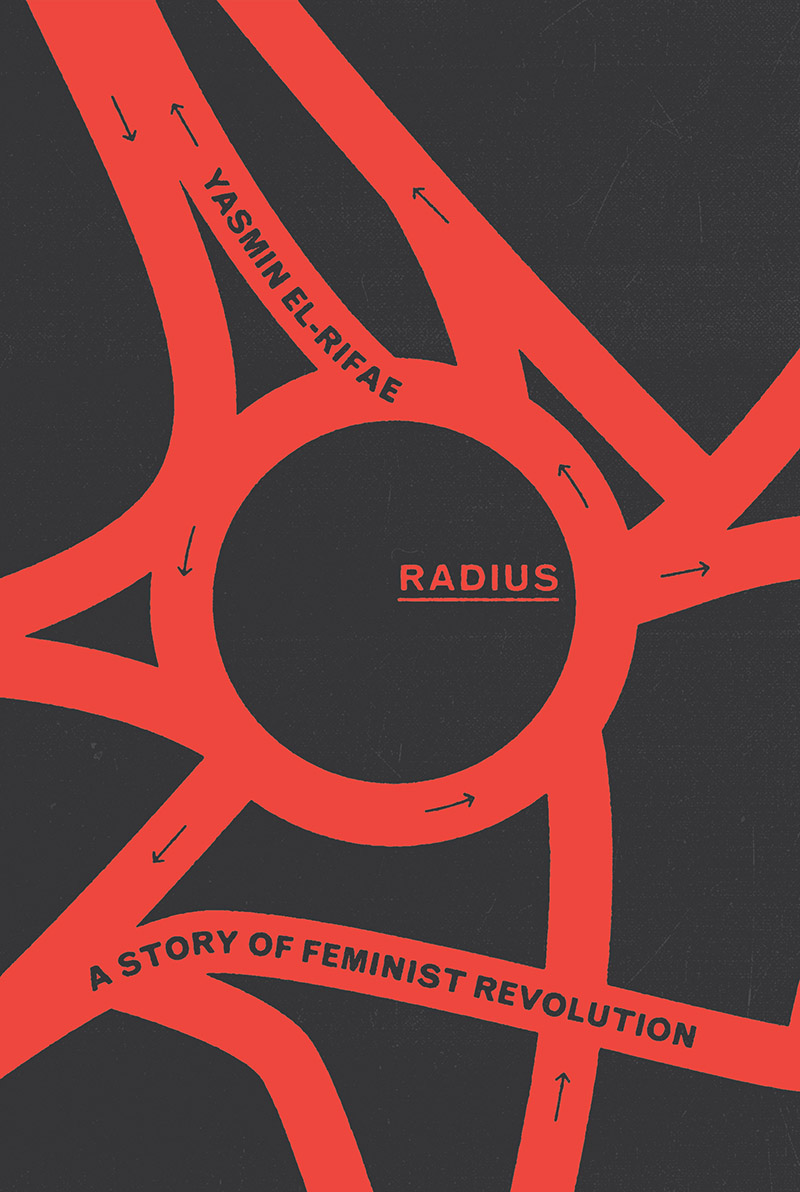When the first protests of the Egyptian revolution began in Cairo’s Tahrir Square on 25 January 2011 they were focused on police brutality. In fact, the fight for bodily integrity was always a key part of the uprising’s call, along with the keystone chant of ‘Bread, Freedom and Social Justice’. Hosni Mubarak, who had been president for thirty years, resigned in February as a result of the protests, and the military held power until popular elections were held in 2012. These were won by Mohamed Morsi, the Muslim Brotherhood candidate, but he was seen to quickly abandon the revolution’s aims in favor of the Brotherhood’s own agenda. His government proved unable or unwilling to reform or hold accountable a security establishment that had long viewed Islamists as the enemy.
Popular protests continued, and women were at the center and on the frontlines as people used their bodies to make all kinds of political and economic demands. However, in late 2012, a series of mob sexual assaults began in Tahrir Square, in which women protesters were repeatedly beaten, stripped, assaulted and raped. In response, civilian groups organized intervention squads to rescue women under threat. One of these groups was Operation Anti-Sexual Harassment and Assault (Opantish). Opantish was led and organized by women, and insisted on a woman’s right to participate in revolutionary action in all spaces and at all times. In the process of protecting friends and strangers from life-threatening violence, many volunteers were themselves attacked. Over the winter of 2012–2013, Opantish grew more organized, more militant and more sophisticated, running getaway cars, operation rooms and coordinating hundreds of volunteers. The violence in the square was not isolated – it was connected to the many ways that women’s marginalization feeds broader social oppression.
On 3 July 2013, Morsi was ousted in a coup led by General Abdel Fattah el-Sisi, then the Minister of Defense. In 2022, el-Sisi remains Egypt’s president and his government is criticized by Egyptian and international rights groups as well as the UN Human Rights council for its restrictions on freedom of expression and the right to peaceful assembly.
–
April 2013
The party was on a terrace overlooking the Nile but it could have been for rich young people anywhere in the world – girls wore summer dresses, as if the streets surrounding us were different ones. Men held whiskey glasses or green bottles of beer. The atmosphere wasn’t quite carefree but the soundtrack and the wardrobe were different from the run-down bars around Tahrir. Everyone was talking about their summer plans, joking about the electricity cuts, which were happening almost daily, and cursing the Brotherhood’s government. I was talking to a friend’s brother and trying to avoid discussing politics, but he insisted on it.
‘I don’t think the Brotherhood are equipped to govern,’ he said. ‘They’re ruining the economy and causing irreparable damage.’
I didn’t want to argue with him because I didn’t think it would be of any use. There was plenty to fault the Brotherhood for, and I thought we should fight for early elections. But right beneath his line about their incompetence I sensed a feeling beyond annoyance, an anger at Islamism and the poor and it wouldn’t be long before we were talking about whether Egyptians were ready for democracy or if what we really needed was a strong leader and a decade of financing from the IMF.
‘Forcing Morsi out of power would give the Brotherhood a legitimate grievance to hold on to forever,’ I said. ‘Also, it would mean military rule, at least for a while. I don’t think generals should be in charge of the country, do you?’
His eyes dropped to my bare legs, and contempt took over his face. He was thinking that, were the Brotherhood really able to apply their vision of the world, I wouldn’t have been able to dress like that, wouldn’t have had the social enclaves within which to do so. He was probably also thinking that I shouldn’t dress like that anyway, not without a boyfriend or fiancée nearby.
It’s a look I’d seen from men before at parties and gatherings, which I felt was a response to the double betrayal that women ‘like me’ were guilty of: betraying mainstream conventions as well as the codes of upper-class circles that think of themselves as socially liberal but also hold deeply paternalistic attitudes. ‘Why do you look so serious?’ ‘Why is your hair not blow-dried straight, ever?’ ‘Why do you ride taxis alone? Where is your car, your driver?’ ‘Why don’t you smile more?’
Later that night, another man asked me: ‘What personal rights are you missing here, in Egypt?’ when I told him about the human rights organization I was interning with. I said something about women’s rights, about freedom of expression, about gay rights. His face hardened, and then he actually asked me: ‘Do you have a boyfriend?’
There were no big rallies in the square in the spring of 2013, and in that quieter time some of us talked about how we could take female resistance beyond Tahrir, beyond protests. How we could turn it into a national movement. It seemed obvious. How else would the revolution continue? Women had been central from the beginning, and everyone had made a big deal of being surprised about that. Now it had become clear, been marked on our bodies, that the social is the political is the physical and there was no use in pretending otherwise.
‘We could go to the universities, labor unions, and schools,’ Arwa said. ‘We should start chapters in towns and villages around the country.’
In a notebook, I wrote: ‘Eventually we’ll draw in the domestic sphere, and that’s when we’ll have real change: when the women who actually run most households in the country rise up against the husbands who beat and control and abuse them.’
I made lists of people to talk to: leaders of past student movements, human rights advocates, radical organizers from the ’70s, women in India and in Latin America who we should look up and learn from.
We talked about what Opantish could do outside of the square. For each suggestion put forward – patrolling public transport, for example – there was a reason not to act on it, usually along the lines of not wanting to become an NGO. This wasn’t only because of compromising realities of funding and bureaucracy that NGOs have to navigate; it also came from an aversion to the way most rights focused NGOs dealt with sexual harassment. Many of them framed sexual violence as an issue of class, education, and awareness and called for tougher policing as a remedy.
For many of us, cooperating with the police or state authorities was out of the question. Aside from the long history of impunity around police abuse and torture of detainees, in the first year of revolution military police had forced protesters in detention to undergo so-called ‘virginity tests.’ Survivors, who were also beaten and abused in other ways, spoke out, and one young woman, Samira Ibrahim, took her abusers to court. A high-ranking general told CNN the tests were done ‘because these women are not like your daughter or mine.’
After the mobilization by Opantish, the spring months of 2013 felt politically suspended. There was a great deal of anger at the Brotherhood from revolutionary camps as well as wider society. Morsi had issued a constitutional declaration in which he exempted all executive decisions from judicial review, adding fuel to suspicions of the Brotherhood. There was also incendiary rhetoric from Brotherhood leaders, documented torture of opposition protesters by Brotherhood supporters, the betrayal of all the electoral promises and pacts they had made with revolutionary groups in order to keep the military’s candidate from the winning the presidency in 2012, and a cavalier tone that seemed to define their approach to governance.
Meanwhile, the old military establishment had begun to gather political momentum, backstage at first. A public campaign called Rebellion appeared that spring and centered itself around a national petition against Morsi, demanding early elections or that he step down by June 30. We know now that that campaign was quickly infiltrated and controlled by military intelligence. The actual coup against Morsi would begin with large protests slated for June 30, but in reality its first steps were in motion throughout the spring. The government was failing, rebellion was everywhere. The only thing that was clear was that the square would be full, and Opantish had to be ready.
–
I was away the two weeks before June 30. I saw the emails between people in Mosireen, about going out to the marches and walking in twos, the fear about lists of people to be killed … I thought everyone had lost their minds. Then I came back on the 30th and went straight from the airport to Opantish. And as soon as I saw the streets, I knew. I knew that we (the revolution) had lost.
– Leila, 2018
–
June 30, 2013
10:00 p.m.
The long corridor on the other side of the accordion metal gate where T and Joanna stood at the entrance to the Tahrir metro station was completely dark. The gate was pulled most of the way shut but there was enough space for one person to get through.
‘I’ll go first,’ T said and squeezed in sideways through the opening.
‘Go ahead, I’m right behind you,’ Joanna said, turning on the torchlight on her phone and beaming it ahead of them, and T felt a moment of gratitude that it was Joanna – maternal, middleaged – who had come running down here with her.
T pushed aside her dread and tried to remember the layout of the station, which had been closed since the early weeks of the revolution.
The only information they had was what Adam had said in a hurry over the phone: that a young girl had been taken by a crowd to a police point in the station after an attack, that she was being pressured to undergo a virginity exam, and that the lawyers Opantish had called to intervene were still on their way.
They walked down the wide, dark corridor, Joanna’s phone the only source of light. ‘I think – ‘ T began but was interrupted by loud voices volleying off the walls of the corridor. She couldn’t make out the words, but she was sure that the voices were male, that there were more than one, and that they were getting closer.
She recognized the pitch: these were joyous chorales of young men. There was repetition – a chant, sing-song.
‘Joanna …,’ she started saying, but Joanna had already turned her phone’s torchlight off.
‘They’re just partying,’ Joanna whispered. ‘Just stand still, maybe they’ll pass us.’
They pressed their backs against the wall. First they saw the light from the men’s torch, bouncing around manically. The light was on the wall across from them, then it was on the ceiling, then it was to T’s right. She could see its wide white beam going past Joanna: it landed on the wall a few feet beside her, and then it was moving again.
Now they heard their steps as well as their voices. Here they were – six or seven of them, and T finally could make out what they were singing: ‘Morsi’s leaving and he’s never coming back, back, back.’
The singing was moving closer and closer, the light was bouncing around and then just like that the men walked past them, taking their song to the exit of the station, to join the crowds celebrating above ground.
When the singing had faded, Joanna switched her phone light back on. They kept walking into the darkness. T tried again to visualize a map of the station. Two lines ran through it. Four different directions. Four different platforms. Was there just one central booth for tickets? Is that where the police office would be? A wooden door to the side?
The corridor turned into an open space. The ticket booth sat wide, the glass of its four windows reflecting only the empty darkness. Black and white printouts about ticket rates for senior citizens were still taped on the inside. They walked on both sides of the booth, shining the light on all the walls. There were no doors, nothing that looked like a room or an office.
There were train platforms on either side of them. Joanna pointed the light upward to the left: the sign read El Marg. To the right, Helwan.
The silence was broken quickly, shockingly, by the rumble of a train. It sped through the empty platform toward El Marg, the cars lit up on the inside. The air around T and Joanna moved fast and hot. Could the people on the train see them? What would they see? Two women holding a light from a phone, wandering around the dark.
‘Let’s try the other platform,’ T said once the silence returned. They climbed over the turnstiles – Joanna shone the light for
T to go first, then she followed.
They walked down the platform. T could hear voices, muffled, low. ‘Do you hear that?’ she asked.
‘Yes,’ Joanna said. Joanna’s light moved carefully along the wall as they walked. The blue and white tile stopped, and there was a metal door, painted dark blue.
The light rested on the door handle. T straightened her back.
She put her hand on the handle and paused for a second before pushing it down. They were both surprised when it pushed right open.
Inside the room, T and Joanna found a small wooden desk with a policeman in uniform sitting behind it. There was no plaque or namecard on the desk, no pictures on the walls.
A woman in her twenties sat on a folding table against the far wall. Another woman, wearing a dirty white doctor’s coat, stood next to her.
‘What’s happening in here? Who is in charge?’ Joanna said, looking around at everyone in the room.
‘Everything will be fine,’ one of the uniformed men said. ‘This girl got into a bit of trouble, so we are making sure she and her mother are taken care of.’
T noticed the mother for the first time. A slightly larger woman, she stood next to her daughter and shook her head, her eyes on the floor.
T turned to the officer. ‘We ’re taking them home. There are lawyers on the way. If you want to open a case file on this, you can deal with them when they get here.’
The officer looked at her, tapping his fingers on the empty desk. She could feel the stares of the other men on her in the subterranean room.
Aboveground
Nahya felt so hot in the crush, but it was the multitude of bodies – of teammates – around her that made her able to act, to keep moving as her team made its way slowly through the packed square.
The noise was incessant, deafening. Vuvuzelas, drums, chants, people with loudspeakers opining, singing, rallying. She was unable to think. Green laser lights jumped all around them from within the crowd, from nearby buildings, from the numerous stages that had been set up around the square. On one stage, a police force musical band was getting ready to perform. They were at the entrances to the square, too, for the first time since the revolution broke out two and a half years ago.
Underground
‘It’s for her own good,’ the man behind the desk said. ‘She wants to do it.’
‘Yes, she needs to be reassured that she’s still intact,’ said the alleged doctor.
Aboveground
Nayha’s team passed a group of women chanting ‘Sisi, be my President!’
In 2011, General Sisi had said that the virginity tests forced on female protesters by military police were done to protect the army against possible allegations of rape.
Underground
‘Get out of my way,’ T said and moved past the doctor.
T stood in front of the young woman. She recognized the catatonic look on her face.
‘Do you want to leave?’ she asked her.
The young woman looked at T but didn’t speak.
Her mother said, ‘They told us it would help protect her rights, her honor. If anyone found out that she was violated . . . ’
Joanna cut in.
‘Is this where you want your daughter to have her private parts checked? In a metro station, under the ground?’ she asked her.
The woman didn’t reply, but hesitation strained her face.
‘If you want a full exam, we can take you to hospital with a proper doctor.’
Just then the two young lawyers came into the room.
‘Come on, let’s go, let them deal with this. We will take you wherever you want to go,’ Joanna said.
This promise worked. The mother put her arm around her daughter and said, ‘Let’s go,’ guiding her past the woman in the white coat.
‘We’re going, you have my number,’ T said to the lawyers. The light from Joanna’s phone guided them out of the station.
T walked next to the young woman. Behind them, Joanna kept the mother engaged, reassuring her they know the way out. They climbed the stairs back above ground.
Military helicopters chopped circles above them, dropping flags down to the people packed below. Beamed onto the wide Mugamma building overlooking the square were the words THIS IS NOT A COUP.
Image © Ramy Raoof

This is an excerpt from Radius: A Story of Feminist Revolution by Yasmin El-Rifae, forthcoming from Verso Books.








